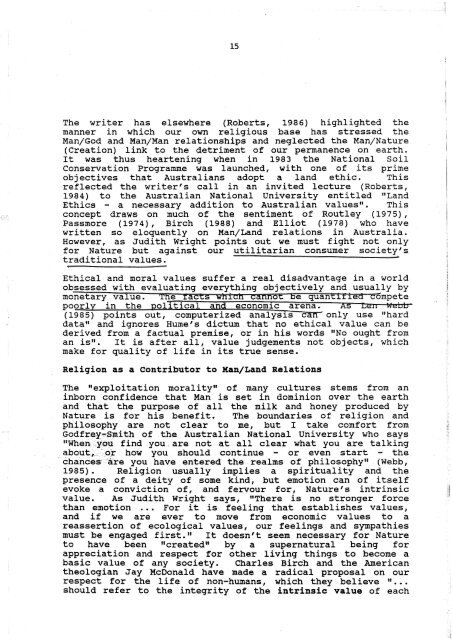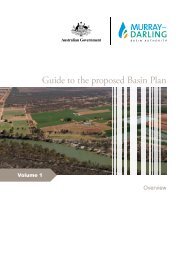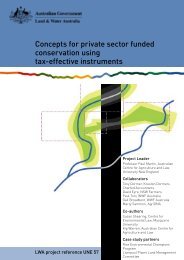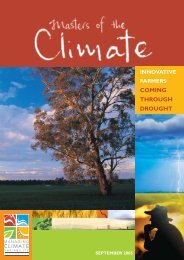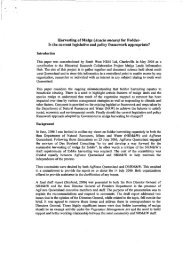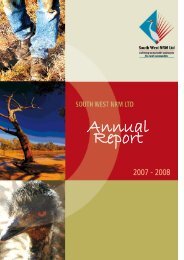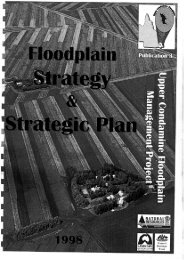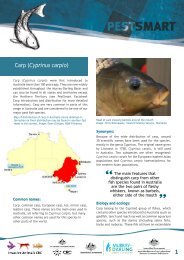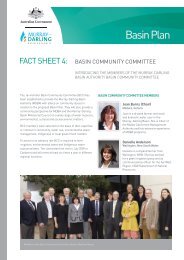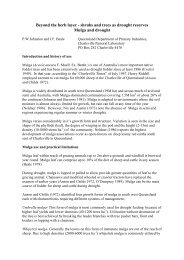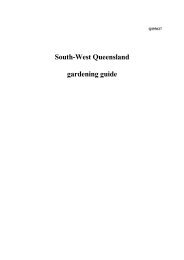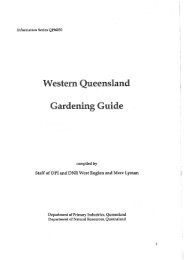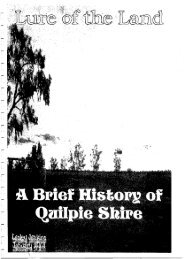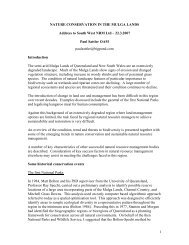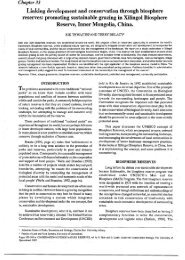soil-conservation-people-religion-and-land.pdf - South West NRM
soil-conservation-people-religion-and-land.pdf - South West NRM
soil-conservation-people-religion-and-land.pdf - South West NRM
Create successful ePaper yourself
Turn your PDF publications into a flip-book with our unique Google optimized e-Paper software.
The writer has elsewhere (Roberts, 1986) highlighted the<br />
manner in which our own religious base has stressed the<br />
Man/God <strong>and</strong> Man/Man relationships <strong>and</strong> neglected the Man/Nature<br />
(Creation) link to the detriment of our permanence on earth.<br />
It was thus heartening when in 1983 the National Soil<br />
Conservation Programme was launched, with one of its prime<br />
objectives that Australians adopt a l<strong>and</strong> ethic. This<br />
reflected the writer's call in an invited lecture (Roberts,<br />
1984) to the Australian National University entitled "L<strong>and</strong><br />
Ethics - a necessary addition to Australian values". This<br />
concept draws on much of the sentiment of Routley (1975),<br />
Passmore (1974), Birch (1988) <strong>and</strong> Elliot (1978) who have<br />
written so eloquently on Man/L<strong>and</strong> relations in Australia.<br />
However, as Judith Wright points out we must fight not only<br />
for Nature but against our<br />
's<br />
traditional values.<br />
Ethical <strong>and</strong> moral values suffer a real disadvantage in a world<br />
obsessed wit<br />
m<br />
P<br />
(1985) points out, comp only use "hard<br />
data" <strong>and</strong> ignores Hume's dictum that no ethical value can be<br />
derived from a factual premise, or in his words ''No ought from<br />
an is". It is after all, value judgements not objects, which<br />
make for quality of life in its true sense.<br />
Religion as a Contributor to Man/L<strong>and</strong> Relations<br />
The "exploitation moralityit of many cultures stems from an<br />
inborn confidence that Man is set in dominion over the earth<br />
<strong>and</strong> that the purpose of all the milk <strong>and</strong> honey produced by<br />
Nature is for his benefit. The boundaries of <strong>religion</strong> <strong>and</strong><br />
philosophy are not clear to me, but I take comfort from<br />
Godfrey-Smith of the Australian National University who says<br />
'When you find you. are not at all clear what you are talking<br />
about, or how you should continue - or even start - the<br />
chances 'are you have entered the realms of philos~phy~~ (Webb,<br />
1985). Religion usually implies a spirituality <strong>and</strong> the<br />
presence of a deity of some kind, but emotion can of itself<br />
evoke a conviction of, <strong>and</strong> fervour for, Nature's intrinsic<br />
value. As Judith right says, "There is no stronger force<br />
than emotion ... For it is feeling that establishes values,<br />
<strong>and</strong> if we are ever to move from economic values to a<br />
reassertion of ecological values, our feelings <strong>and</strong> sympathies<br />
must be engaged first. It doesn't seem necessary for Nature<br />
to have been "createdt1 by a supernatural being for<br />
appreciation <strong>and</strong> respect for other living things to become a<br />
basic value of any society. Charles Birch <strong>and</strong> the American<br />
theologian Jay McDonald have made a radical proposal on our<br />
respect for the life of non-humans, which they believe vq...<br />
should refer to the integrity of the intrinsic value of each


